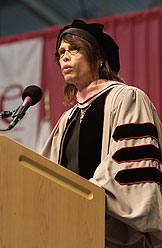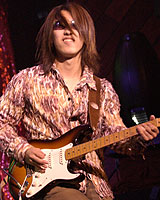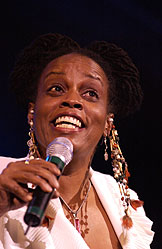Diane Reeves and Steven Tyler: Singing on the Edge
By Rob Hochschild
Berklee.edu Editor
May 15, 2003
Steven Tyler delivers the 2003 commencement address. Farnsworth/Blalock Photos
When you're holding a guitar and the lead singer of Aerosmith points a finger in your direction, you'd better be ready to make something happen. Such was the case for Berklee senior Daisuke Kunita last Friday night, and ready he was.
The moment came during the 2003 Commencement Concert, after honoree Steven Tyler stunned the audience and joined students in a performance of the Aerosmith classic, "Dream On." Midway through the song there is a finger-picked guitar break that Tyler typically hears his bandmate Joe Perry play. He turned and pointed toward Kunita, but the 22-year-old guitarist didn't need the cue. He was already on his way toward nailing the solo and sending the song toward its emotional peak. While Tyler screamed the vocals, Kunita added fills behind him. It was a performance that will go down in the Berklee history books, and it's one Kunita won't soon forget.
"I was pretty nervous when Steven Tyler came on stage, but it was a very fantastic experience," Kunita said later. "He was a rock star before I was born and I can't believe I played 'Dream On' with him."
Tyler and Grammy Award-winning jazz vocalist Dianne Reeves, who also surprised the Berklee Performance Center crowd by performing with students at the concert, both received honorary doctor of music degrees at the next day's commencement ceremony, and both gave kudos to the students during speeches.
"I want to thank you for letting me be the lead singer of the greatest, no, the second-greatest rock band to come out of Boston," Tyler said of the student band, which included six background singers, a horn section, and a 17-piece string section. "To let me sing along with you, it was a beautiful, beautiful thing."
When Reeves stepped onto the stage, she instructed the band to play a blues in the key of G and she improvised lyrics for two choruses before asking student vocalists to come out and improvise scat solos and lyrics of their own. In her commencement address, Reeves complimented the students' talent and lack of fear.
Student guitarist Daisuke Kunita solos during the commencement concert. Farnworth/Blalock Photos
"Don't be afraid of the edge," she said. "I was so inspired by all of the students. And the edge is your friend. See, when you have your tools in order, you can go to that edge, and jump off, and just fly. Everybody was flying last night!"
One of the best examples of a student taking Reeves's music to great heights came from vocalist Christy Bluhm's performance on "Fascinating Rhythm," which appears on Reeves's The Calling. A remarkably mature singer with a smokey tone, Bluhm infused her vocal with a groove as strong as the band's own, and punctuated each verse with several bars of scatting. One of the standout instrumental performances of the night came on the introduction to that tune. Mark Kelley played an extended electric bass solo that veered from funk to jazz, and, at one point, brought an almost vocal quality to the melody of "Amazing Grace."
Vocalists performing Reeves's music excelled throughout the night, particularly Andromeda Turre, on "Comes Love" and "Afro Blue;" Dee Lavender, on "Nine," and Nicole Hurst, on "Better Days." And a four-woman vocal group, Blessed, who have performed together often, provided a nice change of pace on a beautiful rendering of "Softly, As in a Morning Sunrise."
Several Aerosmith songs gave students a chance to show another side of Berklee. Missy Johnson was all sass and spunk as the lead singer on "Dude (Looks Like a Lady)" and "What It Takes"; Danny McLain and Yvonne Williams remade "Cryin'" into a duo r&b raveup; and singer Tom Kivlan was joined by two dancers and a turntablist on "Walk This Way." The most original Aerosmith cover of the night was provided by Blue Light Special, a quartet of fast-pickin' undergrads who rearranged "Last Child" as a bluegrass tune.
Student singers turned in powerful performances on several other Aerosmith songs, including Alicia Champion on "Jaded," Joelle Berger on "Janie's Got a Gun," Alison Bordlemay on "I Don't Want to Miss a Thing" and Mike Teoli on "Sweet Emotion."
"They were just brilliant last night," Tyler said after the commencement ceremony. They've got this freedom thing, the no fear...there wasn't a bad song. There wasn't a bad rendition...It was, wow, your song is even more than you thought."
While the high marks from Dr. Tyler were nice, it was the mentoring from Berklee teachers and their own hard work that made graduation possible for the 695 seniors. Many faculty members were among the more than 3,000 people who watched the ceremony at the Reggie Lewis Track and Athletic Center, in Boston, along with families of the graduates, Berklee administrators, and members of the media. Relatives of both Tyler and Reeves were also in attendance.
Dianne Reeves sings with the student band. Farnsworth/Blalock Photos
Reeves urged students to remember the importance of family, particularly when they encounter difficulties in their careers. And Tyler talked about the influence of his parents, who were both in attendance. He sang a song his mother used to sing to him and thanked his father, a classical pianist, for letting him sit beneath the Steinway when he practiced.
Student speaker Stephen Neale encouraged his fellow students to use their lives and music to make the world a better place. "Choose to be an influence that shapes other people's lives. Choose to go out and teach them to sing, make them dance, inspire them to peace."
The presence of Tyler and Reeves helped charge commencement with the excitement that comes from being around musical heroes. Seniors shouted cheers for the pair throughout the ceremony. Despite their accomplishments, however, both honorees proved to be friendly and accessible. Both took the time to answer questions, sign autographs, and give hugs when students asked for them. Their demeanor provided the ultimate lesson in remaining humble after becoming successful.
"I'm very flipped out with the work that's been done here at Berklee," said Tyler during his address. "It's a refuge for everyone who thinks in rhyme, walks in rhythm, and dreams of melody. Everyone who draws a breath just to hit a note. Shakespeare called it the food of love. Thomas Carlyle called it the speech of angels, and John Lee Hooker called it a healer. So I suppose that makes this a well-fed, heavenly place of healing. Long may you serve the cosmic spirit."


